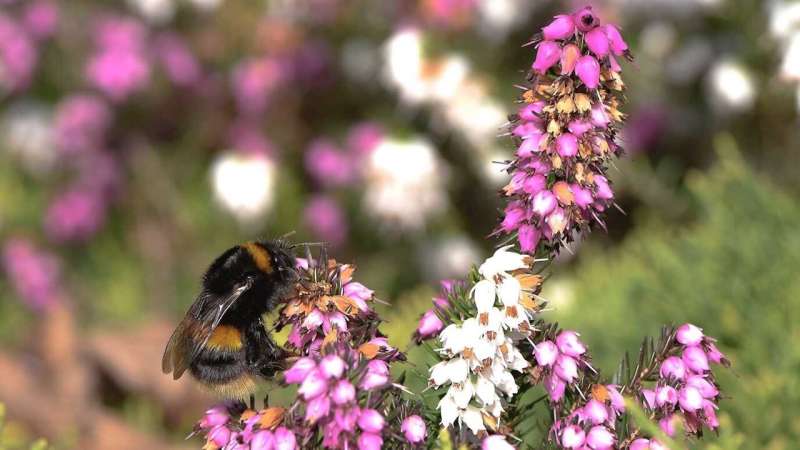Natural caffeine found in floral nectar can prevent disease in bumblebees

A new study published by researchers from Royal Holloway, University of London and the Royal Botanic Gardens, Kew has concluded that caffeine—a naturally occurring compound found in the nectar of many plants—reduces the occurrence and severity of an emerging fungal disease that threatens the health of bumblebees, by reducing the lifespan of worker bees and the production of new queen bees.
In the paper, the researchers reveal that caffeine can reduce the number of infected bees within a colony and that infections were less severe in those bumblebees that did contract the disease. The scientists tested the effect of caffeine consumption on bumblebee colonies that were infected with a debilitating fungal parasite, Nosema bombi, which has been linked to catastrophic population declines in some North American bumblebees.
The effect was also recorded in foraging bumblebees, suggesting that transmission of the disease between bumblebees from other colonies could also be reduced in the field.
The results of the study suggest that florally enhanced landscapes—areas where people actively plant flowers and trees to support biodiversity—could be tailored to act as pharmacies for bees, mitigating the impact of disease in pollinators by offering therapeutically beneficial forage plants.
Dr. Arran Folly and Professor Mark Brown from the Department of Biological Sciences at Royal Holloway, alongside Dr. Hauke Koch, Dr. Iain Farrell and Professor Phil Stevenson from the Royal Botanic Gardens, Kew, used chemical analyses to identify caffeine in the nectar of Sainfoin, which is both an important crop around the world and planted on farms as part of flower-rich margins to support biodiversity. This finding shows that common plants may have beneficial chemistry and could be planted to help prevent disease in pollinators.
Lead author, Dr. Arran Folly, formerly of the Department of Biological Sciences at Royal Holloway, said: "Bumblebees can become infected by a range of diseases that can severely impact both individual and colony health. Just like human diseases, some bee diseases can be treated with naturally occurring chemicals, which act as medicines. Our research shows that if bumblebees are provided access to plants with beneficial chemicals, such as caffeine, then feeding on these can reduce the impact of a fungal parasite both in individual bumblebees and the whole colony.
"In essence, florally enhanced areas, like those found in UK based agri-environment schemes, could be adapted to include flower species with beneficial floral chemistry to help manage pollinator disease."
Agri-environment schemes enable land managers, including farmers, to implement environmentally friendly management and demonstrate good environmental practice, with the aim of conserving and supporting wildlife.
Professor Phil Stevenson, senior researcher at the Royal Botanic Gardens, Kew, added: "Most people will know nectar as the sugary liquid reward for animals that visit and pollinate flowers while pollen provides pollinators with protein and fat. Our recent work has shown they also contain other compounds that could have benefits for insects such as protecting bumblebees against disease. This study demonstrates that we need to learn more about the plants we use to improve our landscapes so we can do this more effectively."
Professor Mark Brown, from Royal Holloway, concluded: "Bumblebees are not only the sound of summer, they are essential pollinators for our crops and wildflowers. However, they, like us, are threatened across the world, by erosion of the habitats that they live in and the emergence of diseases.
"By restoring these habitats in an evidence-based way, we can provide the food and the natural therapies that bumblebees need to thrive. We hope that our work inspires farmers and home-owners to plant flowers that will support the health of these essential and charismatic insects."
More information: Agri-environment scheme nectar chemistry can suppress the social epidemiology of parasites in an important pollinator. / Folly, Arran; Koch, Hauke; Farrell, Iain W; Stevenson, Philip C; Brown, Mark J F. Proceedings of the Royal Society B: Biological sciences, 05.05.2021.
Arran J. Folly et al, Agri-environment nectar chemistry suppresses parasite social epidemiology in an important pollinator, biorxiv (2021). DOI: 10.1101/2021.01.30.428928
Journal information: Proceedings of the Royal Society B
Provided by Royal Holloway, University of London

















